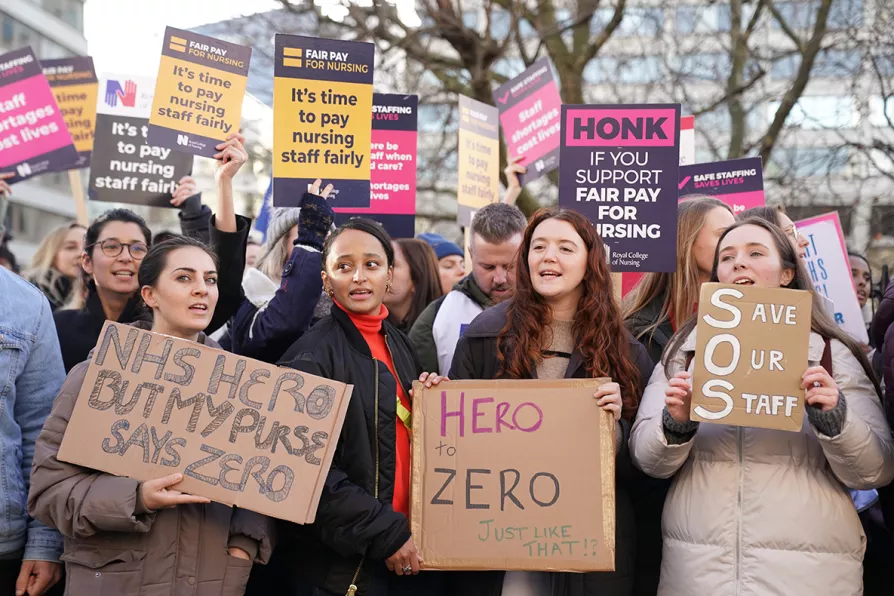
 Members of the Royal College of Nursing (RCN) on the picket line outside St Thomas' Hospital, central London, as nurses in England, Wales and Northern Ireland take industrial action over pay on December 20, 2022
Members of the Royal College of Nursing (RCN) on the picket line outside St Thomas' Hospital, central London, as nurses in England, Wales and Northern Ireland take industrial action over pay on December 20, 2022
“SOMETHING has to change,” Rishi Sunak acknowledged in his new year address today — while pledging an array of oh-so-familiar Tory soundbites.
“Incentivising” people to work through “the welfare system” means yet more attacks on social security at a time when the chronic problem of low pay screams for attention through widespread strikes.
From claiming to be able to halve inflation by holding down pay rather than confronting corporate price-gouging, to pretending he can stop people from making the dangerous journey by boat to seek asylum in Britain without ending the hostile environment, Sunak’s was a dead-end, more-of-the-same speech.
This applies most of all to the issue dominating the January headlines — the National Health Service.
The Prime Minister seeks to mislead. “Something has to change” because the NHS is failing patients despite what he calls record levels of investment and recruitment.
Actually NHS spending in real terms has flatlined since “austerity” began in 2010. Health spending per head averaged 21 per cent less than in France from 2010-19 and 39 per cent less than in Germany.
As for recruitment, the health service faces a staff exodus due to Conservative governments imposing real-terms pay cuts for years on end — a policy Sunak is continuing.
So Sunak is being disingenuous, but we need to dig deeper if we are not to get carried along in a ruling-class conspiracy to trash our NHS in which Labour is as complicit as the Tories.
His messaging is no different from that of shadow health secretary Wes Streeting, who today repeated his mantra that “we cannot continue pouring money into a 20th century model of care.” Streeting and Sunak agree too on increasing NHS dependence on private-sector capacity.
The endless repetition of the idea that the NHS is a 1940s dinosaur drowns out consideration of how Tory and Labour government policy has driven the NHS crisis.
It ignores the impact of bureaucracy and fragmentation introduced with the NHS internal market under John Major. The outsourcing of health contracts to for-profit private providers that began under Tony Blair. The delays, inefficiencies and rip-off prices that flowed from privatisation of NHS Supply Chain.
Though Blair’s Labour governments increased investment in the NHS, they also saddled it with huge long-term debts via PFI schemes. The health service was landed with an £80 billion repayment bill for just £13bn of private investment via extortionate contracts and hospital trusts are repaying them still.
A Spotlight analysis of NHS accounting last year found some hospitals were spending more than twice as much paying back legacy PFI debt as they were on drugs. These debts affect hospital trusts’ ability to fill staffing vacancies and directly undermine patient care.
When we see queues of ambulances outside hospitals and hear of frail patients waiting hours on trolleys in corridors, we should be aware of the causes.
Britain spends much less on healthcare than its neighbours: it is not “pouring money” into a ludicrously inefficient service.
It pays healthcare workers less than comparable countries too: one cause of crippling staff shortages, alongside the inhuman pressure on staff caused by those very shortages.
And it is weighed down with needless cost, waste and debt through the steady infiltration of markets and the private sector.
The answer to these problems is not complicated. Labour was offering it a few years ago: abolishing or bailing out PFI debt and booting all private-sector provision out of the NHS, while increasing investment to meet the needs of an ageing society — something that could easily be funded through taxing the wealthy and is still more urgent given the impact of the pandemic on waiting lists.
Top politicians are set on a different answer: one aimed at undermining the NHS as a universal, free-at-the-point-of-use healthcare system. They must be exposed and defeated.














